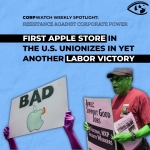Canada: Raffi Says No to Ads for Kids
Throughout my 20-plus years of making music for children, the core value at the heart of my work has been respect for the young child as a whole person. I have not accepted any offers to do commercial endorsements because I believe it's wrong to use one's popularity to sell products to a vulnerable audience.
Last week, I made the difficult decision to cancel my concerts at the Vancouver International Children's Festival -- where I've often performed since 1979 -- to protest the overt commercialization of a festival once staunchly opposed to that idea.
Festival organizers knew of my feeling that arts for the young and advertising don't mix. In recent years, when corporate logos crept onto the grounds, I continued to express my growing concern.
This year, on the first day of the week-long event, I was stunned to discover that, for the very first time, there was a "presenting sponsor" -- an automobile company that was allowed to turn a portion of the festival site into an outdoor car lot with over a dozen vehicles and several large banners. I felt sick at seeing this and knew that I could not be a part of this blatant display of corporate sponsorship.
I realized how disappointed my fans would be to learn we would not be singing together. However, there was an important principle to uphold on behalf of all children, and I trusted that parents would understand. In my public statements to explain my position I have said that corporate support of public events is fine, when necessary, provided it is done with sensitivity and acknowledged quietly. While bowing out of this year's festival was very painful, my spirits have been lifted by the strong positive support I have received.
Perhaps the "branding" of this beloved children's festival in Vancouver -- unthinkable a few years ago -- is best understood as part of the multinational, global gold rush that currently draws waves of resistance worldwide. The fast-food hype, the celebrity-driven advertising, and the reach of corporate branding even into our kids' schools have pushed logos into every corner of our consciousness. It's getting on people's nerves.
Is there a silver lining? This may be an issue that lights a fire with big smoke signals: Pervasive, bottom-line marketing demeans public spaces and diminishes community, and this is most visible in its impact on children.
Advertising aimed at children is so prevalent in our lives that many people think it's okay. But child-development experts for years have said that ads on kids' TV shows, for example, constitute an unfair assault on impressionable minds that aren't old enough to appraise the sales pitch.
And yet, every day, with the help of psychologists, big businesses wage media campaigns that target children from birth as consumers. We need to understand that this serves no one. It's wrong, and it must stop.
Who will look after the children? Is it really so difficult for economists and legislators to envision a business ethic that favours the many? Do we lack the imagination to conceive of a society that respects its young, one that would therefore embrace an honourable protocol for commerce?
We live in a time that many of the world's brightest minds regard as "condition critical" for the Earth and the life-support systems that sustain us. Now is the hour to put children first, to safeguard their lives (and ours) by creating a new code for commerce, and to fundamentally redesign relations between society's public and private sectors. It's a time for corporate humility and compassion.
Corporate shareholders and CEOs must realize that all of us hold shares in a much greater venture -- our collective future on Earth -- and that the economic values we choose to support will largely determine the legacy we leave for generations to come.
Let socially responsible businesses with "multiple bottom lines" deepen the dialogue. How do we reverse the corporate takeover of public spaces? How do we protect children from commercial exploitation? What's fair play between a company's right to do business and a young child's right to breathe freely?
Do we have the courage to change the rules? Whether it's transforming corporate charters into rights-with-responsibilities covenants, or embracing an ecologically intelligent "Quality of Life Index" to replace the GDP, we can engage our duty to our children and create something new. We can take unprecedented steps toward a child-honouring society that enriches everyone.
A member of the Order of Canada, Raffi Cavoukian is an internationally acclaimed singer, composer, performer and author. His autobiography, The Life of a Children's Troubadour, is published by Homeland Press.
- 180 Media & Entertainment


